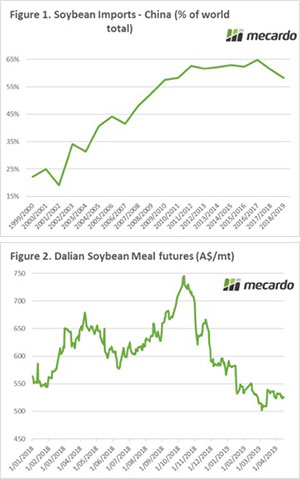Pigs might fly

African Swine Fever (ASF) is the talk of the industry at present. Data out of China tends to be open to a level of interpretation and expectations are that there are higher levels of culling than government reports would suggest. In this article, we will talk about the impact of ASF on the oilseed industry.
Angus has written an article today on the potential impact of the ASF outbreak on the Australian meat industry (Read here)
At present, it is expected that 35-47% of the Chinese pig herd will be culled during this outbreak. A fall of this scale, if realized, will result in reduced demand for animal feed of which Soybean meal makes a large proportion – around 20%.
Since the turn of the century, China has become a whale in the soybean industry. In the early 2000’s they were importing <25% of the global trade in soybeans, they are now importing >55% (Figure 1).

The profit margins from a crush plant are derived mainly from the oil and meal components. If meal demand drops, their crush margins will fall and demand for soybeans will be curtailed.
The current reliance on China as a customer for the global soybean crop will make it difficult to find alternate markets if there is a sharp reduction in demand.
A good indicator of the pig industry in China is the Dalian Soybean meal futures contract. There has been a 42% drop in values from the high in October to the present day (Figure 2). This points towards a major drop in demand and corresponds with the timing of increased incidences of ASF outbreaks.
On another note, If you are looking for something to listen to whilst seeding – give our podcast a shot:
Click here
What does it mean?:
If the forecasts are realized, the demand for animal feed in China will drop drastically. This will have a flow-on effect onto the soybean market, and then onto the rest of the oilseed complex (canola/palm etc).
There will also be an impact on demand for other feedstuffs such as corn and barley. In recent times, Australia has exported substantial volumes of barley into China.
It is important to maintain a close eye on reports from China as this disease could have a major impact on the global grain and oilseed supply chain.
Key Points
- It is expected that China is likely to lose 35-47% of its pig herd.
- China is the worlds largest importer of soybeans.
- Dalian soybean meal futures have experienced a sharp drop in values since the increase in the occurrence of ASF.


